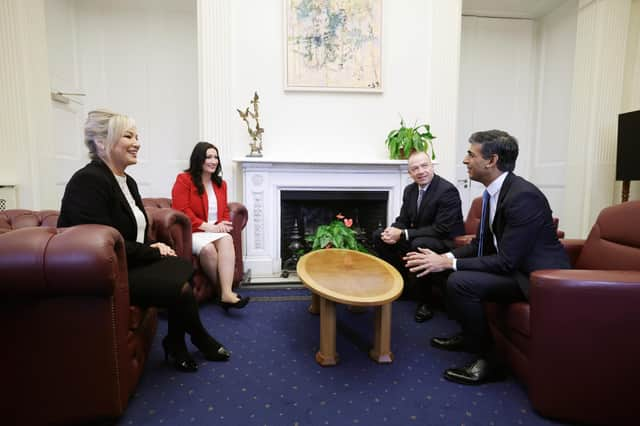Sinn Fein push on all-Ireland economy after FM Michelle O'Neill hails 'considerable opportunities' of Windsor Framework


Sinn Fein president Mary Lou McDonald and vice president Michelle O’Neill met with Prime Minister Rishi Sunak and Northern Ireland Secretary Chris Heaton-Harris at Stormont yesterday as the party focuses on pursuing an all-Ireland economy. It is understood the Sinn Fein leaders objected to elements of the recent UK deal with the DUP amid concerns it adopted a pro-Union approach to issues such as a border poll and the development of an all-island economy.Sinn Fein now hold the economy and finance departments at Stormont – and the party has hailed the Windsor Framework as a tool in pursuing an all-Ireland economic model.
On Saturday, the new first minister Michelle O’Neill said “We will now begin to seize the considerable opportunities created by the Windsor Framework, to use dual market access to grow our exports and attract higher-quality FDI (Foreign Direct Investment). The Windsor Framework also protects the thriving all-Ireland economy, and we must fully realise its huge potential”.
Advertisement
Hide AdAdvertisement
Hide AdThe Framework keeps Northern Ireland closer to the EU’s single market for goods than to the UK’s, with standards aligned. This means frictionless trade between Northern Ireland and the Republic of Ireland.
The party also wants to reform Invest NI to “promote regional balance”. The arms-length body had been under the stewardship of DUP economy ministers for many years. Tourism – which also falls under economy – was seen as a useful tool for unionists to sell NI as a distinct brand.
The department also controls higher education – and the party will be keen to push ahead with plans for a university for Londonderry.
As the biggest party at Stormont, Sinn Fein were able to make economy their first pick when the ministries were being divvyed up.
Advertisement
Hide AdAdvertisement
Hide AdThere had been speculation that the DUP would take finance, but after Paul Givan picked education – Sinn Fein’s Caoimhe Archibald took the post.
Former economy minister Gordon Lyons will now be the communities minister dealing with welfare, regeneration, housing, sport, culture and more.
Comment Guidelines
National World encourages reader discussion on our stories. User feedback, insights and back-and-forth exchanges add a rich layer of context to reporting. Please review our Community Guidelines before commenting.